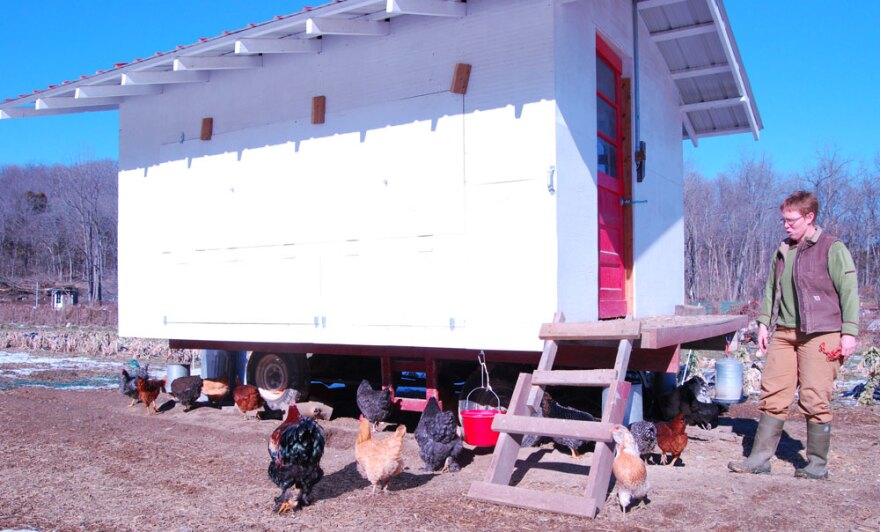Shoppers looking for organic food may have to look a bit harder this year.
When Congress enacted new farm bill legislation on Jan. 1, it cut virtually all funding for organic agriculture programs while retaining billions in subsidies that largely benefit conventional farms. That means it will be more difficult for many farms to continue to be certified organic producers and consumers may not see as many certified organic products in stores or at their local farmers market.
Liz Graznak, who runs Happy Hollow Farm in Jamestown, Mo., is one of many farmers who say they may not be able to afford the cost of organic certification without federal support. Graznak was one of more than 9,343 farmers who took advantage of the U.S. Department of Agriculture’s National Organic Certification Cost-Share Program in fiscal year 2011. The program reimburses farmers up to $750 annually for organic certification costs.
“My certification costs on an annual basis are close to $800,” said Graznak, whose dozens of chickens and vegetables have been certified organic for the past four years. “That would be really foolish of me to pay that and not get any cost-share money back.”
The National Organic Certification Cost-Share Program was an organic farm subsidy that up until January was funded by the Farm Bill. When Congress passed a temporary farm bill extension in January the $22 million program was one of many Congress chose not to continue to fund.
Graznak and the other organic producers will have to pay out of pocket if they want to continue to sell with the U.S.D.A. organic seal. For her part, Graznak says the $800 she typically pays to get certified may have to go toward paying electric bills or the mortgage.
“It [the certification] is important but it’s also $800 where I’m not making any money,” she said. “It’s really hard.”
Without cost-share, Graznak says she may not re-certify her farm organic this year even though she’ll use the same organic practices. She doesn’t think she’ll lose her regular customers who buy directly from the farm or at the local farmers market. But without the organic seal, Graznak does worry about losing future customers – and that could definitely hurt her bottom line.
The cost-share program wasn’t the only organic program that didn’t get its funding extended. Lawmakers also cut $20 million dollars in annual organic agriculture research and a $5 million program for organic data collection.
With Washington’s recent focus on belt tightening, it’s no surprise that lawmakers cut farm bill programs. But after cutting virtually all the support for organic farmers, Congress didn’t touch crop insurance or the direct payment program that pays $5 billion dollars annually to farms that grow major commodity crops. Those are subsidies that only a small percentage of organic farms qualify for.
Dan Kuebler, an organic vegetable grower who owns The Salad Garden in Ashland, Mo., says he feels unfairly targeted.
“Why aren’t we all just created equal? That’s what America’s about – so let’s just do that in our policy,” Kuebler said outside the Columbia, Mo., USDA office. “I don’t want to have a battle with the big growers. I don’t want to deny them what they need; I just want it to be fair.”
There are more than 17,200 certified organic operations in the U.S., up from just 7,300 a decade ago. But with the number of total farms expected to decline 8 percent by 2020, according to the Bureau of Labor Statistics, the growing organic sector represents a bright spot for rural America.
Cutting organic programs from the farm bill won’t mean organic food disappears from grocery stores and farmers markets. And there’s no guarantee that these subsidies won’t come back once lawmakers hammer out long-term agriculture policy, which they’ll try to do in the coming months. But for now at least, the cuts will make it harder for organic farms to stay in business.
Rick Boller, who has run an organic grain and cattle farm in Lebanon, Kan., for roughly 20 years, says even experienced organic farmers count on farm bill funds.
“We’re dependent on whether we can get enough income from the farm, and if there’s any help or not, and how good the insurance levels are and everything else,” he said, “just like conventional people are.”
Without farm bill support, organic farmers have an even tougher row to hoe. And so do shoppers looking to buy organic food.
This story was reported with help from the Harvest Network. Want to help us report the news? Join the Harvest Network.
Harvest Public Media, based at KCUR, is a collaborative public media project that reports on important agriculture issues in the Midwest. To learn more, visit www.harvestpublicmedia.org, like Harvest Public Media on Facebook or follow @HarvestPM on Twitter.



